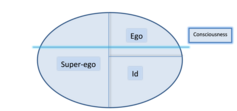Psychoanalysis is a set of theories and therapeutic techniques that deal in part with the unconscious mind, and which together form a method of treatment for mental disorders. The discipline was established in the early 1890s by Sigmund Freud, whose work stemmed partly from the clinical work of Josef Breuer and others. Freud developed and refined the theory and practice of psychoanalysis until his death in 1939. In an encyclopedic article, he identified the cornerstones of psychoanalysis as "the assumption that there are unconscious mental processes, the recognition of the theory of repression and resistance, the appreciation of the importance of sexuality and of the Oedipus complex." Freud's colleagues Alfred Adler and Carl Gustav Jung developed offshoots of psychoanalysis which they called individual psychology (Adler) and analytical psychology (Jung), although Freud himself wrote a number of criticisms of them and emphatically denied that they were forms of psychoanalysis. Psychoanalysis was later developed in different directions by neo-Freudian thinkers, such as Erich Fromm, Karen Horney, and Harry Stack Sullivan.
Psychoanalytic theory is the theory of personality organization and the dynamics of personality development relating to the practice of psychoanalysis, a clinical method for treating psychopathology. First laid out by Sigmund Freud in the late 19th century, psychoanalytic theory has undergone many refinements since his work. The psychoanalytic theory came to full prominence in the last third of the twentieth century as part of the flow of critical discourse regarding psychological treatments after the 1960s, long after Freud's death in 1939. Freud had ceased his analysis of the brain and his physiological studies and shifted his focus to the study of the psyche, and on treatment using free association and the phenomena of transference. His study emphasized the recognition of childhood events that could influence the mental functioning of adults. His examination of the genetic and then the developmental aspects gave the psychoanalytic theory its characteristics. Starting with his publication of The Interpretation of Dreams in 1899, his theories began to gain prominence.
An anal retentive person is a person who pays such attention to detail that it becomes an obsession and may be an annoyance to others. The term derives from psychoanalysis techniques employed by Sigmund Freud.

In Freudian psychoanalysis, the term oral stage or hemitaxia denotes the first psychosexual development stage wherein the mouth of the infant is their primary erogenous zone. Spanning the life period from birth to the age of 18 months, the oral stage is the first of the five Freudian psychosexual development stages: (i) the oral, (ii) the anal, (iii) the phallic, (iv) the latent, and (v) the genital.
Castration anxiety is an overwhelming fear of damage to, or loss of, the penis—a derivative of Sigmund Freud's theory of the castration complex, one of his earliest psychoanalytic theories. The term refers to the fear of emasculation in both a literal and metaphorical sense.
The genital stage in psychoanalysis is the term used by Sigmund Freud to describe the final stage of human psychosexual development. The individual develops a strong sexual interest in people outside of the family.

In Freudian psychoanalysis, the phallic stage is the third stage of psychosexual development, spanning the ages of three to six years, wherein the infant's libido (desire) centers upon their genitalia as the erogenous zone. When children become aware of their bodies, the bodies of other children, and the bodies of their parents, they gratify physical curiosity by undressing and exploring each other and their genitals, the center of the phallic stage, in the course of which they learn the physical differences between the male and female sexes and their associated social roles, experiences which alter the psychologic dynamics of the parent and child relationship. The phallic stage is the third of five Freudian psychosexual development stages: (i) the oral, (ii) the anal, (iii) the phallic, (iv) the latent, and (v) the genital.
Erikson's stages of psychosocial development, as articulated in the second half of the 20th century by Erik Erikson in collaboration with Joan Erikson, is a comprehensive psychoanalytic theory that identifies a series of eight stages that a healthy developing individual should pass through from infancy to late adulthood.
In Freudian Ego psychology, psychosexual development is a central element of the psychoanalytic sexual drive theory. Freud believed that personality developed through a series of childhood stages in which pleasure seeking energies from the child became focused on certain erogenous areas. An erogenous zone is characterized as an area of the body that is particularly sensitive to stimulation. The five psychosexual stages are the oral, the anal, the phallic, the latent, and the genital. The erogenous zone associated with each stage serves as a source of pleasure. Being unsatisfied at any particular stage can result in fixation. On the other hand, being satisfied can result in a healthy personality. Sigmund Freud proposed that if the child experienced frustration at any of the psychosexual developmental stages, they would experience anxiety that would persist into adulthood as a neurosis, a functional mental disorder.
Ego psychology is a school of psychoanalysis rooted in Sigmund Freud's structural id-ego-superego model of the mind.
Developmental lines is a metaphor of Anna Freud from her developmental theory to stress the continuous and cumulative character of childhood development. It emphasises the interactions and interdependencies between maturational and environmental determinants in developmental steps. The level that has been reached by the child on the developmental lines represents the result of interaction between drive and ego-superego development and their reaction to environmental influences; thus stressing the influence of the internal structures of the child as well as the environment of the child.
Anal expulsiveness is a theorized state of a person who exhibits cruelty, emotional outbursts, disorganization, self-confidence, artistic ability, generosity, rebelliousness and general carelessness.
Polymorphous perversity is Sigmund Freud's descriptive term for the non-specific nature of childhood sexuality in its primordial form. In psychoanalytic theory, infantile sexual energy (libido) is yet to be definitively channelled into specific aims and objects, and is capable of focusing itself in any direction and on any object. The term points to the amorphous and changeable nature of the libido prior to being shaped in the processes of socialization and psycho-sexual development. Sexual pleasure in this sense is not merely genital, but potentially present in all sensual interactions, including touching, smelling, sucking, viewing, exhibiting, rocking, defecating, urinating, hurting, and being hurt. It is this original non-specificity of the libido in early childhood that makes possible the variations of the sexual drive that later manifest as so-called 'perversions’ in the adult.
In psychoanalytic theory, regression is a defense mechanism involving the reversion of the ego to an earlier stage of psychosexual development, as a reaction to an overwhelming external problem or internal conflict.
The latency stage is the fourth stage of Sigmund Freud's model of a child's psychosexual development. Freud believed that the child discharges their libido through a distinct body area that characterizes each stage.
Psychoanalytic theory posits that an individual unable to integrate difficult feelings mobilizes specific defenses to overcome these feelings, which the individual perceives to be unbearable. The defense that effects this process is called splitting. Splitting is the tendency to view events or people as either all bad or all good. When viewing people as all good, the individual is said to be using the defense mechanism idealization: a mental mechanism in which the person attributes exaggeratedly positive qualities to the self or others. When viewing people as all bad, the individual employs devaluation: attributing exaggeratedly negative qualities to the self or others.
The Blacky pictures test was a projective test, employing a series of twelve picture cards, used by psychoanalysts in mid-20th century America and elsewhere, to investigate the extent to which children's personalities were shaped by Freudian psychosexual development.

In neo-Freudian psychology, the Electra complex, as proposed by Swiss psychiatrist and psychoanalyst Carl Jung in his Theory of Psychoanalysis, is a girl's psychosexual competition with her mother for possession of her father. In the course of her psychosexual development, the complex is the girl's phallic stage; a boy's analogous experience is the Oedipus complex. The Electra complex occurs in the third—phallic stage —of five psychosexual development stages: the oral, the anal, the phallic, the latent, and the genital—in which the source of libido pleasure is in a different erogenous zone of the infant's body.

In classical psychoanalytic theory, the Oedipus complex refers to a son's sexual attitude towards his mother and concomitant hostility toward his father, first formed during the phallic stage of psychosexual development. A daughter's attitude of desire for her father and hostility toward her mother is referred to as the feminine Oedipus complex. The general concept was considered by Sigmund Freud in The Interpretation of Dreams (1899), although the term itself was introduced in his paper A Special Type of Choice of Object made by Men (1910).

Sigmund Freud is considered to be the founder of the psychodynamic approach to psychology, which looks to unconscious drives to explain human behavior. Freud believed that the mind is responsible for both conscious and unconscious decisions that it makes on the basis of psychological drives. The id, ego, and super-ego are three aspects of the mind Freud believed to comprise a person's personality. Freud believed people are "simply actors in the drama of [their] own minds, pushed by desire, pulled by coincidence. Underneath the surface, our personalities represent the power struggle going on deep within us".





